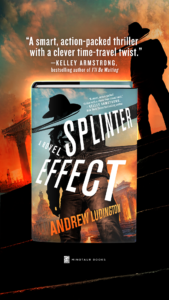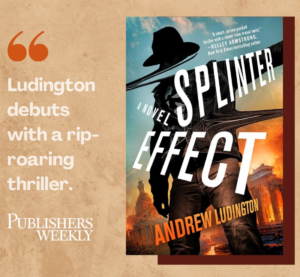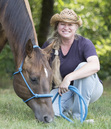Splinter Effect: Debut Thriller
Splinter Effect by Andrew Ludington
Author Interview + Book & Author Info!Don’t miss any ITW Debut Author interviews! Click the link here.Splinter Effect In Splinter Effect, an action-packed debut by Andrew Ludington, time traveling archaeologist Rabbit Ward maneuvers through the past to recover a long-lost, precious menorah hidden in ancient Rome.
In Splinter Effect, an action-packed debut by Andrew Ludington, time traveling archaeologist Rabbit Ward maneuvers through the past to recover a long-lost, precious menorah hidden in ancient Rome.
Smithsonian archaeologist Rabbit Ward travels through time on sponsored expeditions to the past to secure precious artifacts moments before they are lost to history. Although exceptional at his job, Rabbit is not without faults. In a spectacular failure twenty years ago, he lost both the menorah of the second temple and his hot-headed mentee, Aaron. So, when new evidence reveals the menorah’s reappearance in 6th century Constantinople, Rabbit seizes the chance for redemption.
But from the moment he arrives in the past, things start to go wrong. Rabbit quickly finds out that his prime competition, an unlicensed and annoyingly appealing “stringer” named Helen, is also in Constantinople hunting the menorah. And that’s only the beginning. The oppressed Jewish population of the city is primed for revolution, Constantinople’s leading gang seems to have it out for Rabbit personally, and someone local is interested enough in the menorah to kill for it.
As the past closes in on him and his previous failures compound, will Rabbit be able to recover the menorah before it’s once again lost in time? With new and old dangers alike hiding behind every corner, time might just be up for Rabbit’s redemption―and possibly his life.
To Purchase Splinter Effect, click the link here.Splinter Effect: Interview with Debut Author Andrew LudingtonSplinter Effect centers on a time traveling archaeologist named Rabbit Ward. Tell us about that character and how you came to create the world he lives in:
It’s funny how these things come in layers. The first thing that came to me for this series was the hook – a world in which time travel is possible, it’s known to everyone, and it is primarily used for tracking down precious artifacts from the remote past. I worked in sponsored research administration for many years. I know that world. I know that research funding for basic, foundational science has always been thin. Applied research (e.g. cancer research) has always been better funded. So, I rolled with that principle and applied it to my world.
In Rabbit’s America, no one is willing to fund time travel (which is, in the story, expensive) if they don’t get something to show for it. That led me to Rabbit, who loves his work, but deeply resents the economics that make it possible. He’s a classic, “bite the hand that feeds you” kind of guy. And, if he’s that kind of guy, it’s going to naturally bite him back, right? So that layered on the problems he has at the beginning of the story – his career is endangered, and his lack of ingratiating behavior means no one will bail him out. Layer upon layer.
The other thing I had to think about early on was how to deal with time travel anomalies. You know, the “I go back in history and accidentally hit my grandfather with a car” sort of problem. I won’t go into that too much here, but the Splinter Effect is a core principle of time travel in my world that tackles that problem. And, happily, it opened up so many questions in my head that it fueled an entire series.
Splinter Effect sends Rabbit back to 6th Century Constantinople. What kind of research did you do for that time and place?
Curiously, 6th Century Constantinople is less well documented than, say, 1st Century Rome. So, it was time consuming but not impossible to read all the primary sources I could find. From there, I read secondary research as it applied to things I wanted to do in the story. My intention was always, “I won’t include anything that directly contradicts primary or secondary research.” But as long as it cleared that bar and didn’t seem too implausible, I allowed myself to invent.
In my research, I frequently discovered things about the time period that seemed to fit right into the story I wanted to tell. For example, learning that the Jewish population in the Roman Empire of the time was already experiencing increasing restrictions upon their religious freedoms. That expanded and enriched the story I was telling.
Tell us about your road to publication with Splinter Effect:
Like most unpublished authors, I had no idea how to break in at first. I sent my query letter to some carefully selected agents, most of whom replied with cordial form letters of disinterest. One who did take the time to write a custom reply said (and I’m paraphrasing) “this is just the sort of book I should like, but I didn’t like yours.” Ouch!
In retrospect, however, that was just fine. I don’t want to be represented by someone who doesn’t connect with my writing. It’s like the saying goes, “if it doesn’t open, it’s not your door.”
Eventually, I had the opportunity to meet David Hale-Smith from Inkwell at the mystery writer’s conference, Bouchercon, and pitch him my book in person. He liked the idea and asked me to send him pages. A few months later, he signed me. It’s a great match. David and Naomi Eisenbeis got my work, liked my work, and gave me good suggestions for some light touches to make it more marketable. We went on submission and, in what seemed like no time at all, Minotaur expressed interest and eventually bought the first two books in the series!
Splinter Effect is the first book in a series. Will it be an ongoing series, or does it have a known ending?
I’m building the series to conclude in 4 books. I know, most closed series are 2, 3 or sometimes 5 books. But I knew from the outset how the overall arc of the story would play out. By the time I finished book 2, I knew it would take me 4 books to tell the story the way I want to.
When you aren’t writing, you’re a technologist for Northwestern University. Tell us about that part of your career:
You did your homework! (I did!)
My work with Northwestern is in the business applications side of technology. I direct the teams that implement, configure, customize and integrate applications that support University business (HR, Finance, Student Records, Research Administration, Facilities Management etc., etc.) It’s a fun job, and a demanding one.
What are you working on now?
Well, as you know, the writing cycle is always far ahead of the publication schedule. So, while Splinter Effect is out this March, Double Shadow is in the final stages of design for release next March. Meanwhile, I’m nearly done with book 3!
I also have a few manuscripts queued up for polishing for my agent. Never a dull moment.
Words of Wisdom for Aspiring Writers:
I wish I had enough experience to have gleaned wisdom. But I will share one thing that I believe made a big difference in my journey. Before you write “chapter 1,” think about how you would want a fan of your book to pitch it to another person on an elevator ride. If the description you come up with requires too many words for an elevator ride, your fans won’t be able to pass the word. Help them help you!
The other thing that worked for me was consistency. I reserve an hour a day, every day, for writing. Some days I get a little more, very rarely a little less. But being “in” your story every day works a special kind of magic.
Author Pet Corner
Alas, my old pal Roy Batty, a big orange tomcat who was with me for 20 years, died several years ago and I haven’t recovered enough to move on. He greeted me at the door every day after work and sometimes I swear I can still feel him draped over my shoulder, which was his favorite place to be. I miss him.
I’m so sorry for your loss.


ANDREW LUDINGTON writes transportive adventure stories intended to make you forget your commute.
He graduated from Kenyon College with a BA in English Literature and lives in Evanston, IL where he moonlights as a technologist for Northwestern University. Splinter Effect is his first novel.
Follow Andrew on his debut journey: Website, Facebook, Instagram & XElena Hartwell/Elena Taylor

The post Splinter Effect: Debut Thriller appeared first on The Mystery of Writing.



